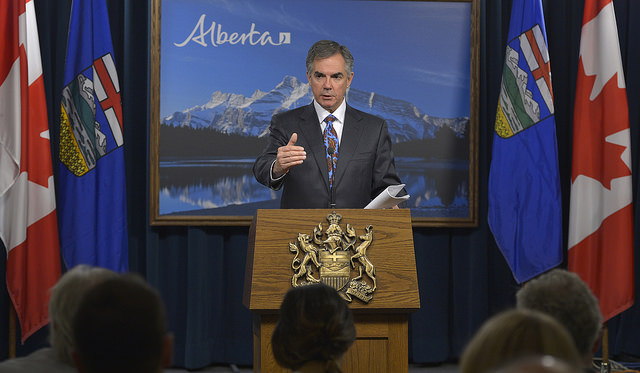On May 5, 2015, NDP leader Rachel Notley brought the Progressive Conservative dynasty to its knees.
Many Albertans, including Ms Soapbox, are over the moon. Others who voted for one of the two conservative parties are wandering around like Li’l Abner’s Joe Btfsplk.
The small-“c” conservative brain trust, with the benefit of 20/20 hindsight, is busy providing insight into why the fall of the PC party was inevitable and how conservatives can rise from the ashes stronger than ever.
Let’s see what three leading small-“c” conservatives have to say.
The perfect storm theory
Former Wildrose leader Danielle Smith is popping up in the media with the alarming regularity of a whack-a-mole.
She blames Ralph Klein. He failed to come up with a “go-forward” plan after he’d balanced the budget. Instead he and his successors turned Alberta into a “workers’ paradise” by siphoning money from the savings trust fund and increasing debt instead of fixing the problem by cutting public services.
Note: Smith makes the same mistake the PCs made — she confuses the PC party with the PC government; they’re not one and the same…or at least they shouldn’t be.
Smith says the Wildrose was poised to set things right when Jim Prentice rode into town and kiboshed their chance to form government. She doesn’t say why, apparently this was self-evident.
Smith says she joined Prentice’s government because she recognized the danger of vote splitting but acknowledges the floor crossing was a failure — it occurred at the wrong time and in the wrong way.
Then Prentice made things worse by delivering a budget that infuriated progressives and conservatives alike.
All the while Alberta had been tilting further and further to the left (witness the election of two young progressive mayors in Calgary and Edmonton).
This created the perfect storm allowing Rachel Notley’s NDP to galvanize progressive voters and put paid to the PC party once and for all.
The oil oligarch theory
Barry Cooper, a member of the group of conservative political scientists known as the Calgary School, agrees with Smith that Ralph Klein put the PC party on the path to annihilation, but he doesn’t identify pandering to the progressives as the root of the problem.
Instead he focuses on the PC party’s mutation into a vehicle for self-promotion. He says the party’s wheels were greased by “oilpatch oligarchs” who think politics is subordinate to economics and business.
It would appear that the PC party agreed with the oligarchs’ view because it allowed the oligarchs to manipulate the party into unseating two premiers (Ed Stelmach and Alison Redford) and recruiting a third (Jim Prentice).
Cooper says the oligarchs were so busy moving the pieces around the chess board that they failed to notice the “stench coming from the…PC machine” and missed the opportunity to protect their interests by switching their allegiance to the Wildrose.
You got that, right? Cooper is not explaining why the PC party fell. He’s teaching an object lesson to the oligarchs: ignore putrefying political parties at your peril. Switch from a dying conservative party to its successor and you will continue to control the levers of power.
Moving forward
Smith’s solution to the demise of the PC party is not surprising given her belief that vote splitting pounded the last nail in its coffin. She says the PCs and the Wildrose must unite and reinvent themselves to become more relevant to a new generation of voters.
A few words from Alberta’s most famous libertarian on what a reunited, reinvented conservative party would look like would have been helpful, but Smith failed to elaborate.
Preston Manning, the father of the Reform Party which evolved into the Canadian Alliance which spawned Stephen Harper (for which I will never forgive him) says the election of the NDP is a blessing in disguise.
The destruction of the PC party will result in a rout of the “PC administration” who drifted away from conservative fiscal principles and “creative” conservative social and environmental values.
Manning says the conservative movement should rebuild from the bottom up, recommitting itself to conservative values, developing platforms that reflect those values and applying them to the issues of the day…or sink into irrelevance.
In the meantime, Manning frets that the NDP will make a hash of the economy unless…wait for it…the private sector comes to the government’s rescue. Manning says the energy sector is hurting and will not be able to provide much assistance, however he urges other economic players to “raise their game.” He wants agriculture, forestry, and the service and knowledge sectors to step in and do lord knows what while we wait for the energy sector to recover.
The logical extension of Manning’s proposal is the elimination of government all together.
The real significance of 5-5-15
5-5-15 marks the day that Albertans told conservatives that the government belongs to the people, not corporations.
On Oct 19, 2015 Canadians will have an opportunity to tell Stephen Harper the same thing.
5-5-15 was a beautiful day in Alberta.
10-19-15 could be outstanding!
Image: Flickr/premierofalberta



